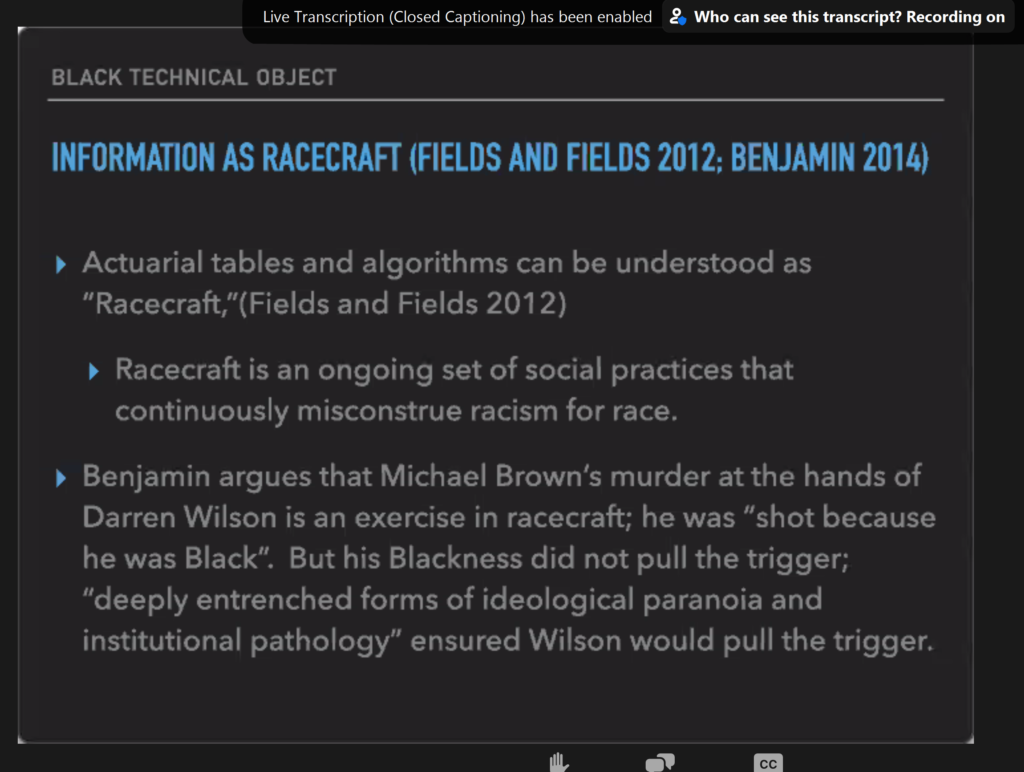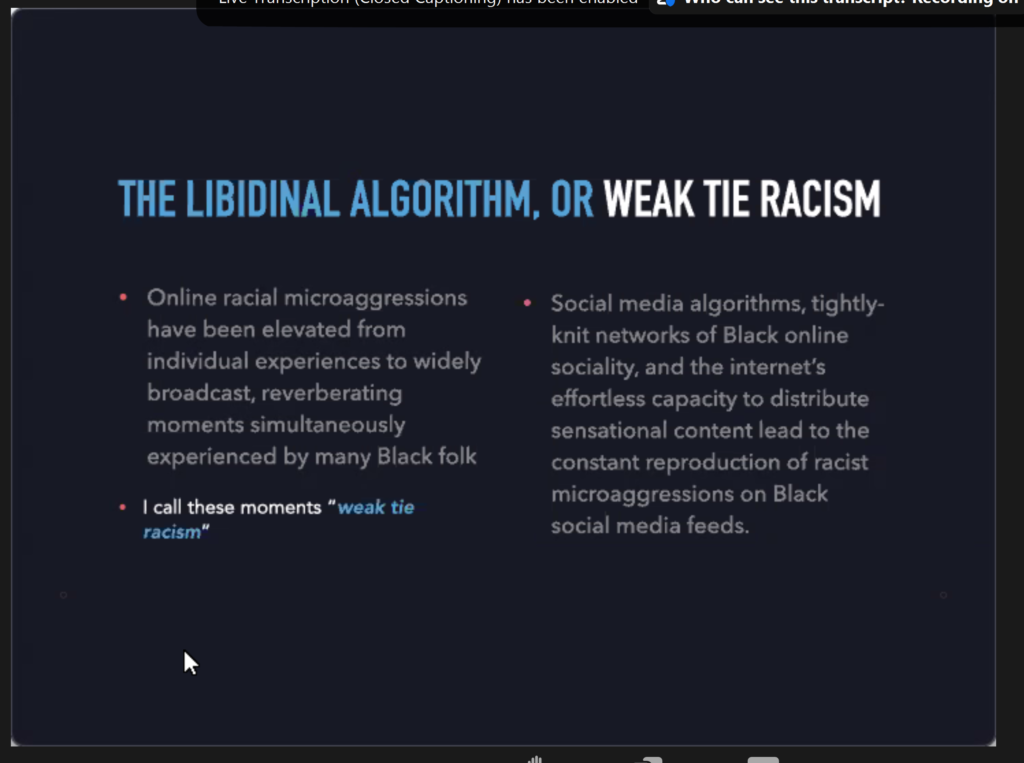Dr. André Brock’s Talk, “Distributed Blackness,” was hosted as part of the Feminist and Accessible Publishing and Communications Technologies Speaker and Workshop Series organized by Dr. Alex Ketchum. It was co-hosted by Concordia’s DIGS Lab (under the direction of Dr. Stefanie Duguay).
Dr. André Brock’s presentation began with a provocation to think beyond the twin discourses that so often dominate our relationship to technicity. On the one hand, we are constantly bombarded by the utopias of techno-philia, whose proponents promise to reformat the very structure of the world for the “benefit of all.” On the other hand, lies the reactionary currents of techno-phobia, which often harbours an unfortunate whiff of conservatism, reifying and idealizing a past that has never been for the benefit of all. Rather than confirm these two primal positions (to love or to fear), Brock’s work chooses to reformat the conditions of the question. It is through denying these moralising and congealed conceptions that the question of desire and its relationship to our social and technical apparatus can be properly posed. It is not a matter of whether or not we desire technology, but whose desire the machine instantiates. Whose fantasies lie at the heart of our algorithms? Who can claim the powers of dissemination built into our infrastructure? And for what purposes?
Thus, as Brock shows, the question necessarily expands. It is not enough to ask about the formal architecture of our algorithmic condition, to tweak the computational models and optimization functions. The entire field is saturated with the historical violence of Whiteness. Reflecting on the media coverage of the Michael Brown murder, Brock argues that the mainstream acceptability of the causal claim, Michael Brown was shot because he was Black, relies on an entire racialized schematism, embedded deep within the functioning of the social field. Operating like a classification model, whose associative architecture has been wired by endless imagery of violence against Black people, Brock points out (via the concept of “racecraft”) that such a claim assigns blackness an illegitimate and obscuring causal agency. If one looks closely, a common statistical refrain rings out: correlation does not equal causation. Rather, the causality of Michael Brown’s murder must be determined structurally and historically, conditioned by the layers of institutional paranoia and pathology that surge beneath Whiteness’s claim to “order.”

It is under these conditions that Brock turns to Jean-Francois Lyotard’s concept of libidinal economy, as a means to capture the fantasies, beliefs and tensions that lurk at the interstices of unconscious societal forms and technical networks. Through this critical analysis, the irrational underside of computation, so often purported as an avatar of rationality, can be made manifest and worked through. This networked circulation of libido is most strikingly developed in Brock’s analysis of “racism without racists,” in which imagery of violence against Black people is ceaselessly redistributed via social media algorithms. Though the imagery may not have been initially shared to traumatize or coerce the Black community, the magnitude of distribution fundamentally alters the everyday online experience of Black people. Passing from node to node, the automated nature of what Brock terms “weak-tie racism” demonstrates how algorithms repeat and intensify traumatic events, allowing them to recur and reverberate at unprecedented scale. Brock argues this is a manifestation of the libidinal economy that underlies White Modernity, and demonstrates how Anti-Blackness is quantified and commodified by data practises that network the libidinal attention of communities through the diffusion of racist and racialized content. It is thus that algorithms themselves can come to be understood as mediums of transmission for historical violence, as condensations of a libidinal historicity which reiterates the violent fantasies of Anti-Blackness.
Though Brock’s presentation primarily focused on libidinal analysis as a powerful critical framework, the notion of desire, and the shared structures of feeling implied therein, play a crucial role in the affirmative and productive dimensions of his thought. During the question period, Brock was asked about his relationship to Afro-Pessimism, a conceptual movement which theorizes Blackness in response to the “social death” (a term invented by Orlando Patterson) imposed on Black people in America. Constitutively excluded, and ceaselessly stolen from at both material and cultural levels, Afro-Pessimism approaches the ontological destruction of Blackness as subjectivity via the denial of rights, ownership and legibility. Despite having affinity for this view, Brock argues that his conception of libidinal economy opens avenues for Black subjectivity that are irreducible to pathology, deviance and resistance, which remain defined by a negative relation to the strictures of Whiteness. It is a matter of distributing and producing Black joy in the wake and memory of exclusion. Thus, the libidinal power of Afro-Optimism focuses on the possibilities of vivification, of live-giving relations, conditioned by networks of mutual care, self-repair and spiritual understanding. Brock argues that this productivity of desire in the face of social death is exemplified by Black sociality both offline and online, which refuses to be reduced to either labour or mere survival.

In his recent book, Distributed Blackness, Brock presents a detailed account of this kind of community formation through an analysis of “Black Technoculture.” Contrary to common racist images which portray Black people as technically uninterested and illiterate, Brock argues that the internet plays a crucial role in Black culture and its diasporic identity. Though these activities are often mediated by “non-innocent infrastructure,” the networked world of Black digital practice, exemplified by Black Twitter and other manifestations of Black online sociality, points to the essentially distributed nature of Black cultural identity. It is in these networks that Brock identifies the re-appropriation of the internet by “a digital practice that upends technocultural beliefs about how information, computers, and communication technologies should be used” (Brock 2021, 6). Contrary to the profit-seeking and commodified logic of White Modernity, Black online sociality presents a model for distributed vivification and the production of communal joy. Most crucially, it demonstrates that community is distinct from networked connection, and that friendship exceeds a simple agreement to share information. It is a reminder of the importance of sharing and sustaining practises of collective desire, of strengthening real communal ties, and of exploring the internet as a medium to expand the possibilities of social life.
Learn more about Brock’s work on Afro-Optimism and Black digital practice, via his monograph: Distributed Blackness: African-American Cyberculture, hosted open-access by NYU Press.



